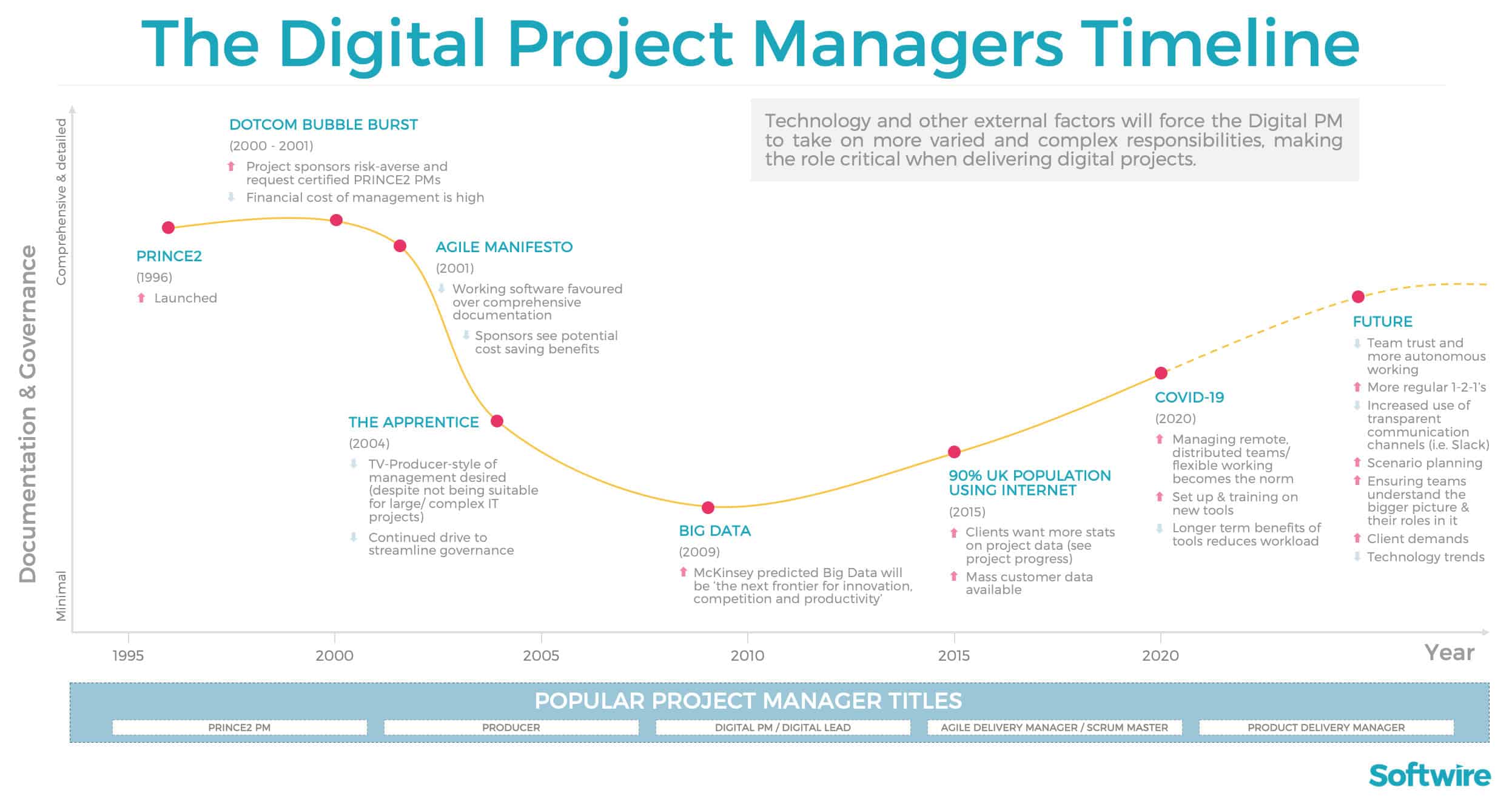

Wind back 20 years, and not many people knew what a project manager did. I’d get quizzical looks when I told friends and family what my job was. A few years later though, all of that changed when a certain reality television show hit the air.
The Apprentice catapulted the project manager, or ‘PM’, into the limelight, as the candidates took turns to project-manage the tasks. Suddenly, everyone had heard of project managers, and there was a spike in people pursuing it as a career option. This resulted in a flood of newly certified project managers into the IT sector.
Driving change in digital project management
The reality, of course, is that complex and large-scale IT projects are rather different from the tasks people saw on television. And yet this influx of new PMs, coupled with other events at the time, noticeably accelerated a change in people’s expectations around the role of the project manager on a digital delivery project.
The shift had really started after the dotcom boom, and has continued to this day, with the COVID-19 pandemic driving yet another rapid evolution in demands.
In this blog, I’ve looked at how the role has evolved over the last 20 years, picked out some of the factors behind the changes, and predicted how the future might look.
Wind back to when the bubble burst…
Cast your mind to the year 2000. As the internet bubble burst, there was a noticeable shift in the way organisations wanted their digital projects to be managed.
In an attempt to avoid another boom-and-bust, risk-averseness became the order of the day. Everything had to be extensively and transparently documented, so that there was accountability for decision-making.
It quickly became common practice for those sponsoring digital projects to require their PMs to have PRINCE2 certification.
A swing away from documentation
Of course, all of this governance didn’t come free. I remember working on big projects where the management actually cost more than production of the core digital product. Over time, this led to growing disillusionment with very process- and documentation-heavy project management techniques.
As a result, organisations started looking for ways to streamline the governance of their digital projects. This was also around the time that the aforementioned influx of Apprentice-inspired project managers was happening.
Producers
I believe these two factors were significant contributors to the growing demand for television-producer-style management of digital projects.
Projects that were operated in this way tended to require much less documentation. While I found the approach worked well for formulaic or repeatable projects, such as digital display advertising campaigns, it fell short when applied to more complex software development. In these cases, there was a need to find middle ground, where there was enough governance in place, without it becoming a millstone.
This was clearly a sentiment that others shared, because subsequently, the early 2010s saw a growth in the appreciation of a specialised Digital Project Manager or Digital Lead, capable of overseeing these complex and larger-scale projects in a more agile way.
The rise of data
The 2010s also saw a boom in the amount of data available to organisations. With over 90% of the UK population using the internet by 2015, the opportunities to collect and leverage the value in data were growing fast.
This is significant because data is becoming ever-more central to the role of today’s digital project managers, particularly since the COVID-19 pandemic has led to most of us now managing remote, distributed teams.
Ways of working will continue to evolve, which will place additional demands on project managers. Against this backdrop, it’s essential we can collect and monitor key data on how our teams and projects are performing – both to run an efficient day-to-day operation and to facilitate easier reporting.
What next for digital project managers?
Even as lockdowns are relaxed, it’s widely expected that flexible working – both in terms of location and hours – will remain at much higher levels than it was pre-COVID-19. Project managers will need to find ways of ensuring workshops and other digital development rituals, such as retrospectives, can still run effectively. This is likely to involve implementing new tools, and training both team members and end customers in how to use them.
There’s also a growing desire in some quarters to run more self-organising teams, inspired by the way successful tech startups have operated. In larger organisations, or where you’re delivering a technology project for a commercial customer, there are constraints, such as scope, budget and timeline, that make running a self-organising team more challenging. That said, project managers will need to find ways to empower their teams to operate more autonomously where appropriate. Regular one-to-ones to address potential issues early, the use of transparent channels to empower more-direct communication between colleagues, avoiding any culture of scapegoating, measures to ensure team morale is maintained, and frequent retrospectives to ensure everything is working optimally, will all become increasingly important parts of the project manager’s remit.
Higher up the organisation, blueprints for successful team operation will need creating, covering a range of scenarios. These plans should include triggers that identify when a team needs to change its shape or ways of working, and provide potential solutions. Digital project managers will need to contribute to the creation and ongoing evolution of these frameworks, and promote knowledge-sharing across the organisation.
Lastly, we’ll need to see digital project managers leading the charge when it comes to ensuring teams understand their roles in the bigger picture. What is the organisational vision? Where does the project fit in for the end customer and for the organisation? And how does the current feature they’re working on support that?
In conclusion
As they have done over the last 20 years, external events, client demands, technology trends and many other factors will continue to shape the role of the digital project manager over the coming decades. One thing’s for certain, though. As all the predictions above suggest, the role will become ever-more varied, complex and important – which is great news for anyone in this space.


